CSU’s legislative internship program at the state Capitol was in danger of being discontinued a few years after it was started in the 1970s because the faculty member who launched it left the university.
A group of political science students marched into the office of the department chair at the time, John Straayer, and demanded that the program be continued.
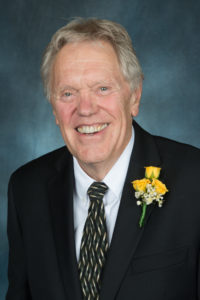
“There was no one else to do it, so I took it over,” Straayer remembers.
Fast-forward 37 years. The political science professor drove his last vanload of CSU political science majors to the Capitol in Denver on April 27, and received accolades for his decades of service from CSU President Tony Frank, state legislators and current and former interns. Gov. John Hickenlooper issued a proclamation naming April 27, 2017, “John Straayer Day.” U.S. Sen. Cory Gardner, who completed the internship program when he was a CSU student, even read a tribute to Straayer on the floor of the U.S. Senate that day.
“Every Tuesday and Thursday, rain or snow, Dr. Straayer, a van or two, and an over-caffeinated, sleep-deprived, ambitious crew of college juniors and seniors would travel to Denver from Fort Collins, under the tutelage of Dr. Straayer, to learn the art of legislation,” Gardner said. “After publishing several seminal books on Colorado politics, accumulating roughly 140,000 miles back and forth to the state Capitol, supervising over 1,000 interns over the years, he is retiring from his service as Colorado’s legislative professor emeritus.”
‘Lasting impact’
Gardner also discussed how interning under former Colorado House Speaker Russell George benefitted him, then described his continuing relationship with Straayer when Gardner returned to the Capitol as a legislator himself.
“He would provide me with interns from the very same program that I was a part of just 10 years before,” Gardner said. “But most of all, he reminded me of the good that comes from our teachers and our mentors — those who look out for us because, from a special place in their hearts, they know that through the gift of their teaching, they will have a lasting impact for generations to come. Congratulations, Dr. Straayer. Thank you for your service to Colorado State University, to the state of Colorado, and thank you for impacting the lives of so many people. And from this United States senator, thanks for being that life-changing spark.”
[masterslider id=”246″]
Gov. John Hickenlooper’s proclamation calls Straayer “one of the preeminent minds working in the area of local and state government, and his scholarship has advanced the body of knowledge in the field, bridged the divide between academics and policy, and served as an invaluable resource to several generations of scholars and practitioners.” Another section notes that, “fueled by a bottomless caldron of coffee and an unceasing supply of peanut butter and jelly sandwiches, Dr. Straayer has nurtured a generation of active minds and civically engaged citizens.”
Hickenlooper’s proclamation also notes that in addition to Gardner, his past students have included former Gov. Bill Ritter, state Sen. Matt Jones and state Sen. Dan Nordberg. Ritter, who now directs CSU’s Center for the New Energy Economy, says Straayer gave him his first C in college — one of only two he got during his time at CSU — in a “State and Local Government” course. Ritter went on to a 20-year career as a prosecutor and served 12 years as Denver district attorney before becoming governor, and now advises governors around the nation on energy policy.
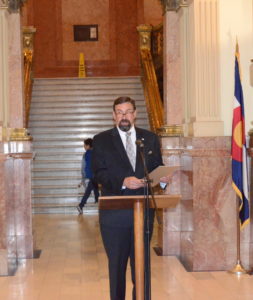
Not done yet
While he’s giving up the internship program, Straayer hasn’t set his retirement date yet. He’s scheduled to teach again in the fall and says he’ll consider staying on for a bit, working part-time, depending on the department’s needs.
The state’s foremost authority on the Colorado General Assembly got hooked on politics after taking an American government course at Western Michigan University. The Grand Rapids native, who had spent three years working in a paper factory’s lab, abandoned his science/engineering emphasis and switched to political science. It’s been 50 years since he came to CSU after earning a Ph.D. in political science from the University of Arizona.
“I started in the Eddy Building because the Clark Building was not finished yet,” Straayer says. “That tells you how old I am. William Morgan was CSU president when I arrived. I stood on College Avenue and watched Old Main burn down. Fort Collins was dry when I got here — for a mixed drink you had to go out to the Black Knight, which was where the Olive Garden is. There was nothing south of Drake.”
His early memories of the internship program include having to take the wheel due to friendly competition between the students driving the two CSU vans to Denver.
“They quickly discovered the excitement of who can get there first,” Straayer says with a laugh. “So I started driving one van.”
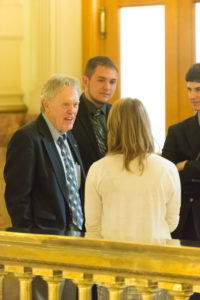
The drive
He adds that some of the best discussions — and teaching moments — came during those rides to and from Denver.
“It becomes a community very quickly,” Straayer says. “The students really bond. Several marriages have come out of it.”
His process for the internship program included giving preference to seniors — juniors only as space allowed — and assigning students to legislators who matched their political leanings. Straayer also prioritized attitude and personal responsibility.
“The number one concerns I have are demeanor and reliability,” he says. “I would tell them they are not just representing themselves, but the university.”
Straayer says he’s seen some unsettling developments unfold over the nearly four decades that he’s been monitoring the state legislature. He criticizes the various financial measures that have been passed through the ballot initiative process and have created a stranglehold on the state budget, including TABOR (Taxpayer’s Bill of Rights), the Gallagher Amendment and Amendment 23.
“We have a horribly dysfunctional aggregation of fiscal policies,” he says, “and we’re on a slow roll to trainwreck.”
Term limits
Straayer also questions term limits, because when lawmakers are finally at the Capitol long enough to learn the system and can serve as mentors to junior legislators, they are kicked out, and the result is a loss of institutional memory.
“It’s like throwing all of the grandparents out and bringing in the grandchildren,” he says. “There’s a learning curve.”
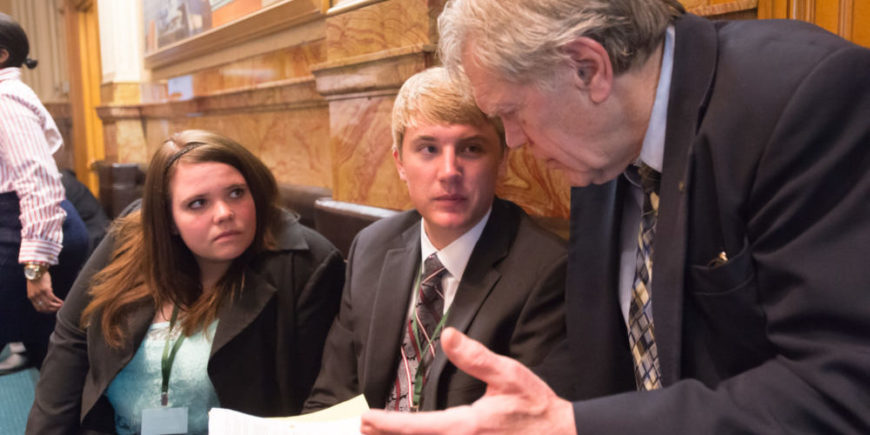
Straayer adds that Amendment 41, which created more stringent ethics rules for state legislators, seems to have had the unintended consequence of increasing divisiveness between Democrats and Republicans. As a result of the amendment’s prohibitions, he says, members of the legislature don’t have as many opportunities to interact with each other socially and gain a better understanding of each other’s personal motivations and the reasons underlying their political stances. Lobbyists used to host functions where lawmakers from both sides of the aisle could have informal discussions and even become friends, but Amendment 41 defines those functions as prohibited gifts.
“Now lobbyists literally can’t buy a member of the legislature a cup of coffee,” Straayer says.
Avoiding partisanship
He says he’s been very careful over the years to keep his own political persuasions out of his efforts to educate his students.
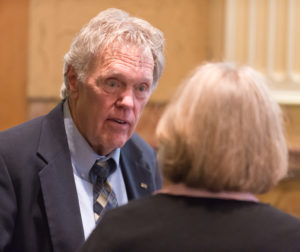
“Overt partisanship in class or at the Capitol would be damaging to the students,” Straayer says. “The integrity of the internship program would be compromised. If I was viewed as an extension of the Republican or Democratic party, this wouldn’t be possible. If I became a political hack, the people who would pay the price are the students, the interns.”
What will he miss most about the internship program? Interacting with his students.
“I’ll miss the students dearly,” Straayer says. “That’s been the real delight. That’s what’s kept me going this long. But I’m 78 years old, maybe it’s time. At some point you decide it is enough.”
When he does officially retire, he looks forward to traveling more with his wife — but he may still occasionally pay a visit to the Capitol to meet with old friends.
“I’m melancholy because I’ll miss the kids, but I’m also relieved, because I finally made a decision that was difficult — and a long time coming.”